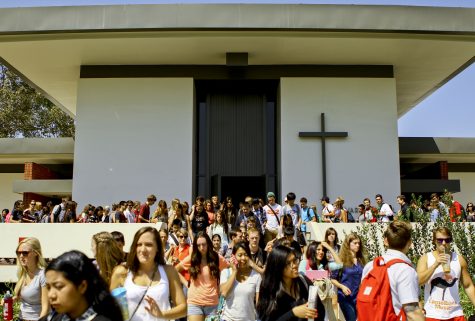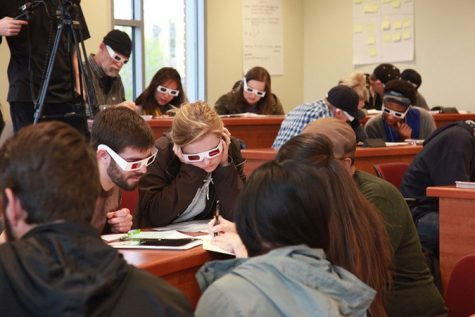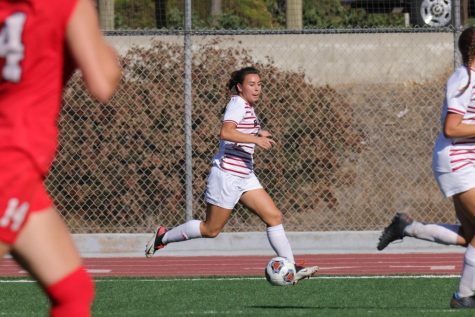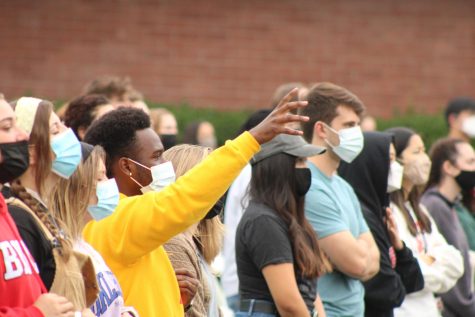Nursing dept. gets unconventional new “patient”
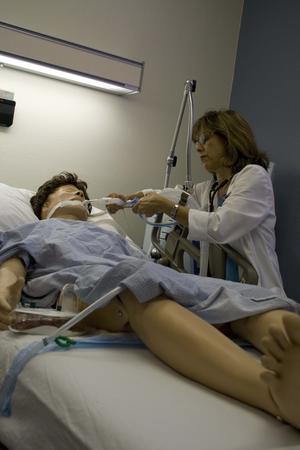
Annette Browning, Assoc. professor of the Nursing Department, demonstrates how students will be exercising the skills.
September 28, 2007
Every day at Biola, students are involved in a struggle to save a man from dying. Some days they succeed; other days, he passes away. Fortunately, the man is not actually alive, and students can always try again. A human patient simulator was donated to the nursing department, dedicated on Tuesday, and is now ready for use in the Kartsman Simulation Lab, located in Soubirou Hall.
The human patient simulator has a pulse that can be checked several places on the body, a heart rate, blood pressure, and it also breathes and talks, telling the nurses what it feels and needs. It can be used in many capacities, as it can represent a patient on a ventilator, a post-operation patient, and a patient who had gone into cardiac arrest. Students are able to listen to its heart and lung sounds and deliver any treatment that a real patient would receive, such as delivering shots or performing CPR, which is monitored and recorded to show the effectiveness of each push down on the chest.
The simulator is invaluable to the program as it gives students the ability to interact with a patient. Senior Erin Moore, a level two nursing student, describes it as “an amazing way to get experience in areas where we can’t get hands-on experience in our student nurse role.”
For the simulations, five students will be the attending nurses to the patient, another five will serve as family of the patient, and the instructor will operate the computer to cause certain situations to occur for the student. After the scenario, there is a debriefing in which they all discuss what happened and what could have been done better.
The simulator was a donation to Biola’s nursing department by Barbara Kartsman. Kartsman lived with Dr. Becky Fleeger for two years and became good friends with her as she helped take care of Kartsman’s father. When Kartsman’s father suffered a stroke in 2006, Fleeger helped to comfort the family and succeeded in turning him to God after many years of his refusal to accept Christ. He passed away 11 days later.
Kartsman sold her father’s property and took a total of $60,000 from the profits. As an act of tithing, she decided to donate it to the nursing program her friend Fleeger had so long been part of. Together with Fleeger and the nursing department, it was decided that the simulator, a mannequin that recreates the vital signs of a human, was what the nursing department needed most.
“It’s great to see that this can help to save more lives in the future,” Kartsman said.
To help with the donation, Presbyterian Intercommunity Hospital donated the bed, furniture, ventilator, IV pump and crash cart, and one of the doctors came to help set up and intubate the simulator, which consists of inserting a ventilator tube down the throat of the patient.
Biola University spent a large amount of time researching simulators to find which one would work best for the department. They decided on the $60,000 model, one that has many functions, but is actually more durable than the more expensive versions.
The addition of the simulator is a gigantic step forward for the nursing department.
“It’s dramatic,” Fleeger said. “This is really a dream come true.”
The use of the simulator gives a new dimension to nursing education because “clinical simulation gives students a hands-on environment that is totally controllable,” according to Gary Miller, Biola’s Provost and Senior Vice-President.
The simulator is to be used by level two and higher nursing students and those who are upper classmen and are being trained in advanced nursing and critical care. According to Assistant Professor of Nursing Dr. Annette Browning, “the vision is to use it across the curriculum and in all the levels.”
This simulator is now giving the nursing program access to new methods of learning that they had never had before.
“We had small bits and pieces to practice on but nothing like a human response, no way to simulate crises a student might encounter,” said Dean of Science Dr. Walt Stangl. “It’s a real step forward into the world of technology.”
Fleeger is retiring after more than 30 years at Biola, but she has been able to witness what she believes is one of the greatest advancements the nursing department has ever received. Even after many years of being one of the head professors of the nursing department, Fleeger is still amazed by the advancements in the field. “If they had said this would have been possible in the future when I was in nursing school, I would have said they were kidding,” Fleeger said.


